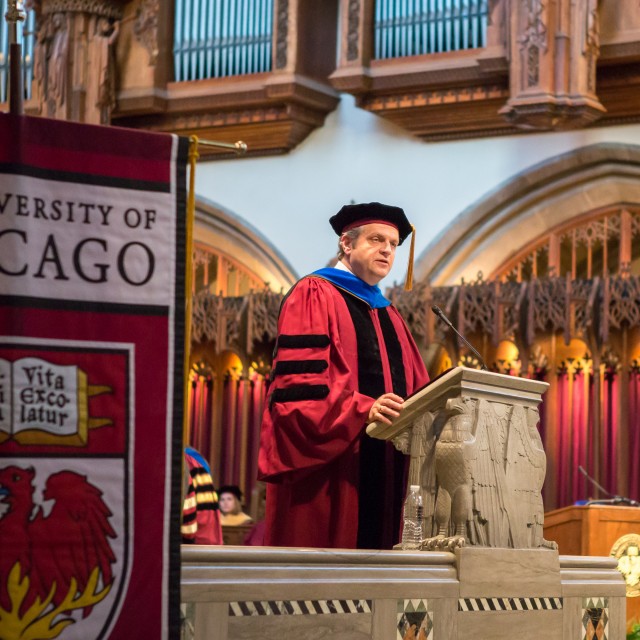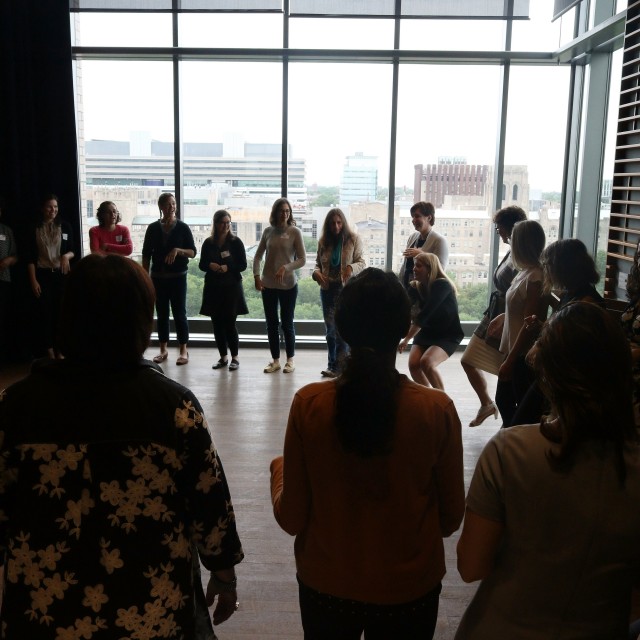On the BSD track, you cannot be an Assistant Professor for more than 7 years, so you must either be promoted to Associate Professor or leave the faculty (and normally the institution). Unless you are promoted early, your promotion materials will ordinarily be due in your departmental office in advance of the department recommendation. Feel free to ask your departmental office when materials will be due, and if any other activities are customary. For example, some departments include a research seminar as part of its deliberations, and these must be scheduled well in advance.
Up-or-out deliberations ordinarily follow a specific timeline. To view it, point to HERE.
There is only one exception to the 7-year limit, known as 'stopping the clock'. Assistant professors who become parents within a specified time window automatically receive extensions, but may opt out. Other circumstances may warrant extensions as the policy describes.
You can be promoted to Associate Professor, Associate Professor with Tenure, or Professor with Tenure.
If you are promoted without tenure, the most common term is 3 years, ending on 30 June. On or before 12.5 months before the end of the term, you must be notified whether you will receive tenure or leave the faculty (and normally the institution). The timeline is the same as for promotion to associate professor (above).
Criteria for Promotion:
- Body of scholarly work of the highest quality characterized by originality, rigor and importance in comparison to others in their respective fields at the same career stage. This body of work should be coherent, and readily identifiable as that of the candidate. Elements of this achievement in the biological sciences typically include formulation of original research ideas, developing the research methodology, recruiting necessary personnel, obtaining funding through peer-reviewed mechanisms, analysis and interpretation of the results, presentation at significant scientific meetings, and publications in high-quality peer-reviewed journals. Publications in the peer-reviewed literature of which the faculty member is typically the first or senior author are typically the primary basis for promotion or tenure. The number of publications is considered, but of more importance is the quality of the body of work, as evidenced by where the publications appear, the impact of the contributions, and the opinions of experts in the field. Work that has not undergone peer review should not be considered. In areas of scholarship for which external funding is necessary to conduct the research, past and likely future peer-reviewed funding success are important considerations.
- Stature comparable to that of recently-promoted associate professors in leading programs elsewhere in the country, with indications that the candidate will become among the leading scholars in a significant field.
- Sufficient quality and productivity in contributions to our educational mission and institutional citizenship, meeting the expectations of your 'job description'
Obviously the above are mainly judgments made by your departmental faculty colleagues, for whom your chair or chief is the spokesperson. For that reason, you should meet regularly with your chair, chief, departmental go-to person, and/or mentor(s) for insight into your progress and career advice.
There is no obligation to promote or tenure assistant professors even if they meet the above requirements.
Promotion Package:
The University of Chicago uses a new system called Interfolio to manage the promotion process. See these candidate guidelines for more information and specific guidance on preparing your materials which include the following:
- Updated CV & personal statements
- Up to 5 exemplary peer-reviewed works, either published or accepted for publication
- Chair’s letter to Dean
- Grid of external assessors, their contact information, and rationale for their selection (if not in Chair's letter)
- Letter used to solicit external assessments
- External assessments
- Internal assessments of clinical and educational acumen, if needed
- Letter of assessment from BSCD Master or documentation that one has been requested (for Basic Science Departments and/or if candidate teaches in The College)
- Teaching evaluations
- Other concurrences, and documents as customary for a department. These might include Section Chiefs' letters and reports of internal promotions committees.
Your department will collaborate with you to prepare these materials.
The Office of Faculty Affairs offers regular programming on the promotion process and other career development opportunities.



